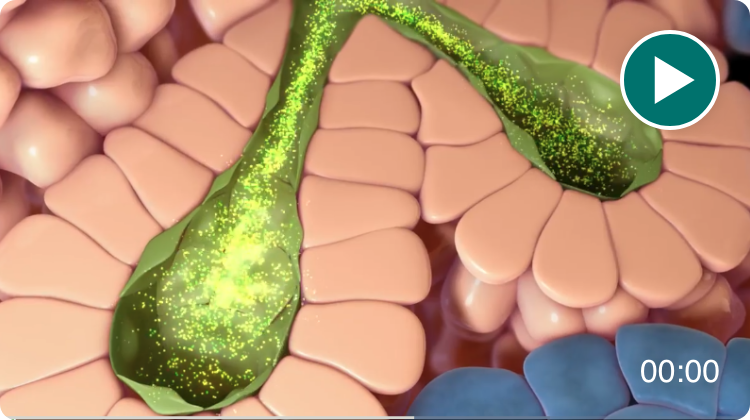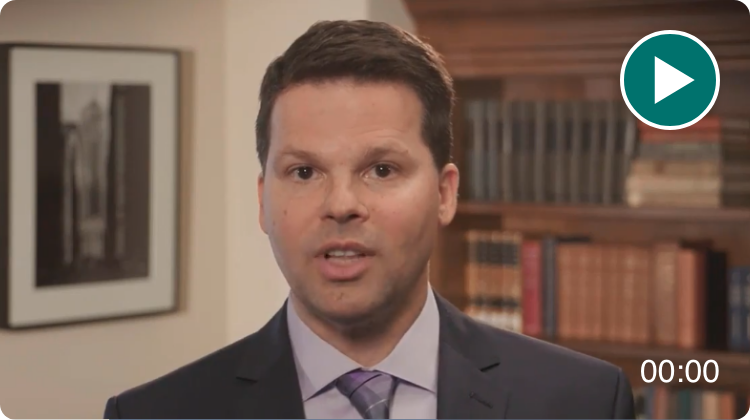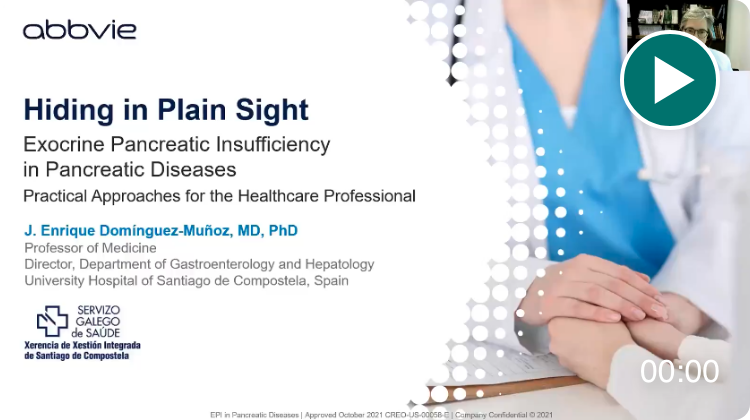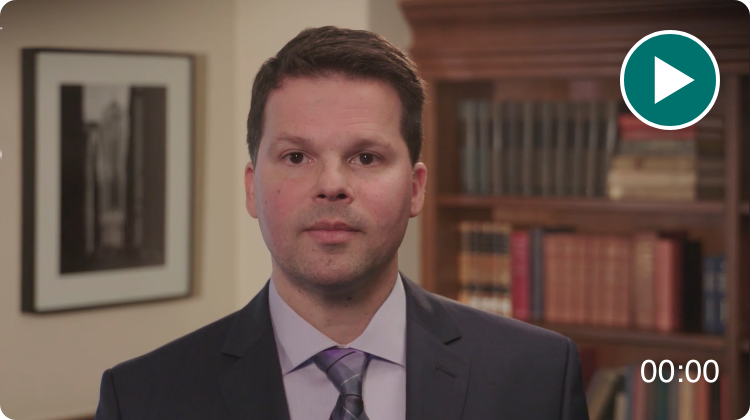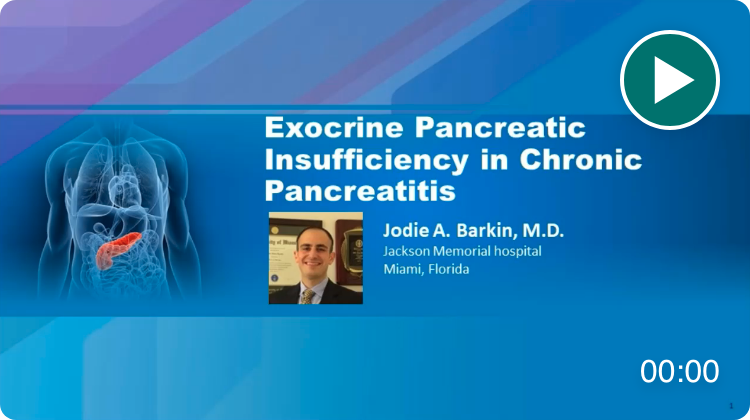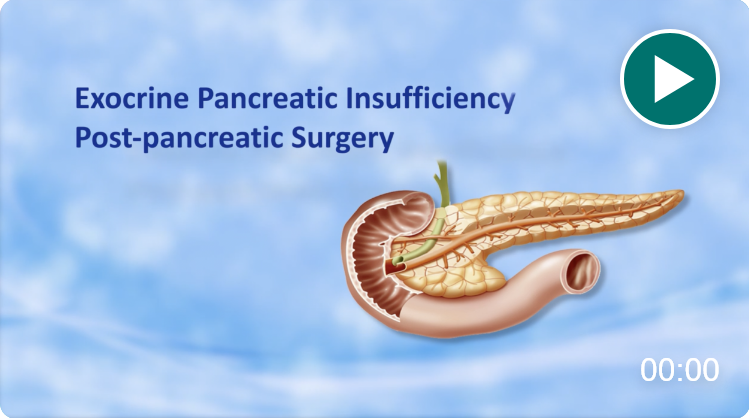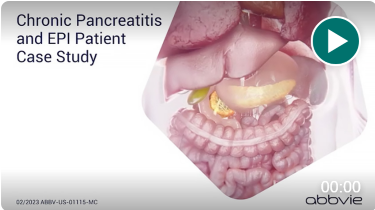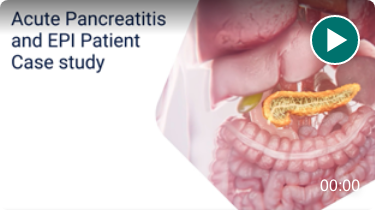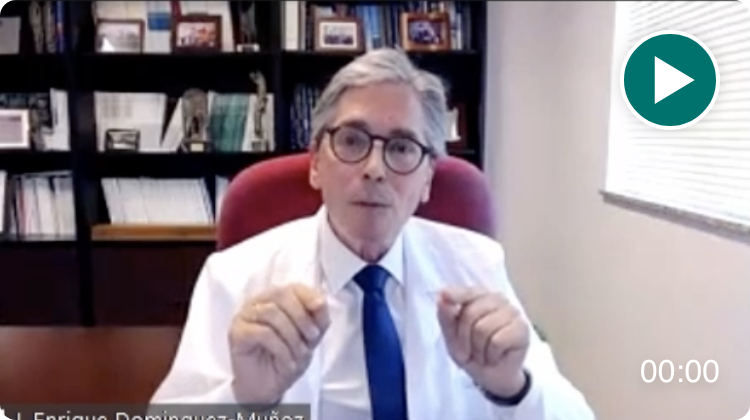
EPI Education
Take a deep dive into EPI and learn from experts in the field.
About EPI: EPI pathogenesis, symptoms, and diagnosis
Etiologies of EPI: Recognize EPI and the barriers to diagnosis
Management of EPI: Key information for managing EPI
Case Studies: Experts present case-based narratives on EPI
Select one or more filters below to explore topic-specific resources.
Transcript
This is a 52-year-old lady. She has a history of smoking and duodenal cancer. She came to us in clinic preoperatively. She was well nourished. She was 5 foot 2. She was 146 pounds. She got a Whipple procedure done. It did have a partial gastrectomy to it.
So, about 2 weeks after discharge, we did see her in the clinic. She was 143 pounds at that time, so not that bad. And the physician that saw her just put in her chart, "She's making better food choices." Her glucoses were high and so she was seeing endocrine.
So, she came back and saw endocrine 6 weeks post-operatively. Her weight at that point was down 129. She was not eating well, reported. She wasn't doing really good. She was having nausea. She was having diarrhea, hypoglycemic.
So, they were working with her on that. And about 8 weeks post-op, she was down to 125. She was having diarrhea and cramping. She was still having hypoglycemia, went back home, came back, and was admitted a week later for dehydration and hypoglycemia.
When she was back in the hospital, she was down 122 pounds. When we went to go see her, she was complaining and saying that she was having frequent stooling. They were yellow, they were oily.
We did decide to start her on pancreatic enzymes after diagnosing her with exocrine pancreatic insufficiency.
Four months post-operatively, her clinic follow-up, she was down to 119 pounds. In between her re-admit and her back to clinic, I was calling her and trying to get her to eat more, and we were really just struggling getting her to eat enough.
So, her weight was down more, 119 pounds. We increased her enzymes because she was saying her stooling was still an issue. We're still working on her diet. We added a chewable multivitamin that she wasn't taking.
But why would you get pancreatic surgery? Cancer tumors in the middle or distal bile duct duodenum, pancreas. You can have cystic lesions or neoplasms, but they can develop into cancer, so you may want to have those removed. Also, your intraductal papillary mucinous neoplasms or IPMNs, mucinous cystic neoplasms, MCNs. Genetic diseases such as MEN1 and pancreatitis.
Post-surgery, you can have different reasons for EPI would be the extent of resection, as well as just post-surgical nutritional consequences related just to the surgery.
The quality of the remnant. Let's say, this guy here gets a pancreatic surgery. I'm thinking the remnant is not so hot. It doesn't look like it's going to work very well. And then you can also have like we're talking about with where we have those anastomosis. If we have a huge leak, the pancreatic enzymes aren't going in where they're supposed to. They are coming out. So, something else to just kind of keep in mind.
All right, so the surgery itself can cause issues like we said. So, consequences of surgery. You have this surgically altered anatomy. You have delayed gastric emptying that can happen. You have possible hyperglycemia. Again, inadequate mixing of enzymes with nutrients. You have this asynchrony.
There was a paper that actually came out. It was really interesting that I didn't get to include in my references. But November 2015, by Hanigan, they looked at esophagectomy and gastrectomy, not even pancreatic surgeries. And they were checking fecal elastase and they were not within normal limits. So, that paper was kind of interesting to look at too, because there again, we're talking about the asynchrony going on.
Changes in gut pH, bacterial overgrowth, all of that can happen because the anatomy is so unusual. It's not the way it should be. With bacterial overgrowth, here you have a blind limb. These patients are often on PPIs after surgery because they don't want that anastomosis to ulcerate or breakdown. So, they don't like gastric acid pouring on it.
So, who cares if somebody has poor pancreatic function? So, you have continued weight loss. You malabsorb your vitamins and minerals. And then exacerbation of malnutrition and weight loss has been associated with delay of chemotherapy, decreased survival, and decreased quality of life.
What do we do for these patients? What is our best practice for these patients nutritionally? I feel like optimal nutrition, it's not just about getting in the nutrition. You need to make sure they are absorbing the nutrition, so it's definitely a pair of those two going together. So, getting their weight history, their diet history, their GI symptoms.
What GI symptoms is causing them to have not eating, or do you think it's leading you to a diagnosis of EPI? Or their anatomy, do they have a distal gastrectomy? Is their stomach intact? How much pancreatic tissue is there? And then what does malabsorption look like?
And so, here are some things that I have heard over time. Leaving a rim in the toilet, being greasy or oily. One thing I have found, you ought to say, "Oh you have a diarrhea thinking in your mind. Like, okay, if you're stooling frequently, that means diarrhea to me." But to them, it doesn’t. Diarrhea, a lot of times means liquid, watery stools. And I'm like, "I don't mean that. I just mean frequent stooling."
So, be very careful and very specific. Do you have changes in color? How often do you have bowel movements every day? So, those are things just to keep in mind be aware of.
And then also, when you're trying to figure out if that's really what they have, keep in mind that it's not the only thing that causes frequent stooling. C. diff obviously is rampant, and that's something we even after they leave the hospital to keep in mind.
Do they have dumping syndrome? If they have a partial gastrectomy, they might be having dumping syndrome. So, really getting, when do you eat? When are you having the symptoms of being uncomfortable? When exactly are you having the bowel movements.
And also, small intestine bacterial overgrowth. That's very prevalent in chronic pancreatitis and also in pancreatic surgery patients where you have symptoms to describe nausea, gas, bloating, diarrhea.

EPI in Post-pancreatic Surgery: A Case Study
Learn about gastrointestinal complications that can occur in post-pancreatic surgery patients.

Take an immersive journey into the physiology of the exocrine pancreas and the pathophysiology of EPI.
